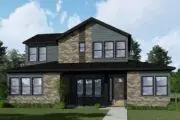
As interest rates rise and real estate prices remain high, housing will likely be on the minds of many Ontario voters when they head to the polls on Thursday, June 2nd.
With the release of the Housing Affordability Task Force’s report earlier this year, it’s been made clear that Ontario has housing supply shortages to address. The next government will have a role in determining where and what kind of housing will be built during the next few years.
Vacancy taxes, cracking down on unethical developer behaviour and revising existing zoning rules are a few of the changes Ontario’s political parties have proposed to constituents on their plans to improve the housing market.
We’ve outlined a pre-election breakdown of what the four major parties are promising in terms of housing for the 2022 Ontario election.
Conservative Party
The 2022 Ontario Budget, released in April, doubles as the party’s election platform.
Construction and Development
- As recommended by the Housing Affordability Task Force’s report, build 1.5 million new homes over the next 10 years.
- Introduce the Community Infrastructure and Housing Accelerator to streamline building approvals for housing and community infrastructure.
- Create the Development Approvals Data Standards to digitize land approval processes.
- Work with municipalities to identify potential measures to discourage land speculation involving projects that have been approved by a municipality but are unbuilt.
Taxes and Investments
- Collaborate with municipal partners over the summer to establish a working group that would share information and best practices to maximize the impact of municipal vacant home taxes.
- Invest over $45 million for a new Streamline Development Approval Fund to help Ontario’s 39 largest municipalities modernize and accelerate processes for project applications.
- Invest $19.2 million over three years to reduce backlogs at the Ontario Land Tribunal (OLT).
- Make significant investments in community housing and homelessness programs.
- Provide an additional investment of $15 million over the next three years to the the Home and Vehicle Modifications Program.
Consumer Protections and Renters
- Heighten fines and administrative penalties imposed by the Discipline Committee on unethical developer behaviour.
- Consult on a mandatory Condominium Information Sheet for pre‐construction condo agreements.
- Increase interest payable on pre-construction deposits.
- Give the Home Construction Regulatory Authority clearer authority to address unethical builder conduct.

Liberal Party
Construction and Development
- Build 1.5 million homes over the next 10 years. Of this total, 138,000 residences would be reserved for affordable housing, which includes 78,000 new social and community homes, 38,000 supportive homes and 22,000 new residences for Indigenous peoples. This target would create an estimated 150,000 jobs per year.
- Create a new “use it or lose it,” levy on speculators with serviced land and approved building permits.
Create a publicly-accessible homeownership registry to crack down on “bad actors,” including pre-construction condo sales. - Scrap Ministerial Zoning Orders (MZOs) and replace them with a new rules-based measure limited to critical provincial projects only.
- Retain and repair existing affordable homes and work with stakeholders to ensure newly-built homes create more ownership options for marginalized communities.
- Collaborate with municipal partners to allow homes with up to three units and two storeys to be built as-of-right across the province, including secondary and laneway suites.
- Include measures with inclusionary zoning bylaws, like increasing the number of overall homes allowed to be built.
- Implement parking maximums for new buildings that are walking distance to rapid transit stations.
- Extend as-of-right zoning to build more student residences on campuses and eliminate development charges for purpose-built student residences.
- Establish the Ontario Home Building Corporation to work with local communities, not-for-profit partners and developers to finance and build affordable homes. Any homes sold by the Corporation would be available only to first-time home buyers, with proceeds directed into affordable housing.
Taxes and Investments
- Implement a vacant home tax worth five per cent of the assessed value on non-Canadian owners and two per cent for Canadian owners with vacant residential units in all urban areas. Any funds that would be generated from the vacancy tax would be put towards affordable housing projects.
- Provide up to $300 million in new funding over five years to help municipalities accelerate projects and community planning permits.
- Invest an additional $15 million annually into the OLT and Landlord and Tenant Board (LTB).
- Expand the Brownfields Tax Incentive Program to provide up to 10 years of property tax relief on all under-utilized commercial space converted into homes.
- Give the co-op sector with $100 million over ten years.
- Reward local governments that meet or exceed housing targets in an environmentally-sustainable manner with capital funding to use for local priorities, such as transit and libraries.
- Fund municipal and non-profit partners with $360 million each year to operate and improve social, supportive and community housing services.
- Provide municipalities and housing support providers with $100 million per year to promote a “Housing First,” approach to end chronic homelessness.
Consumer Protections and Renters
- Work with federal partners to implement a Home Buyers’ Bill of Rights that would reform the blind bidding process, increase home price transparency and make home inspections a legal right for purchasers.
- Require municipalities to reach out to equity deserving groups about housing meetings, advertise meetings on social media, provide accessible online options for participation and prioritize meeting times outside of working hours.
- Require developers who cancel projects to refund buyers sooner and with higher interest rates on deposits.
- Reinstate rent control province-wide on all rental homes to provide greater stability for renters.
- Create a legal framework that provides protections and certainty for owners and renters to opt into rent-to-own agreements.
- Work with municipalities to enhance multi-tenant housing safety and ensure both tenants and neighbours can hold landlords accountable for the safe operation of bedroom rentals.
New Democratic Party (NDP)
Construction and Development
- Encourage development within existing urban boundaries while protecting farmland and natural heritage from urban sprawl.
- Update zoning rules to enable the construction of more affordable “missing middle,” housing, such as duplexes, triplexes and townhomes.
- Immediately begin building 50,000 new and modern long-term, home and community care beds.
- Build 100,000 units of social housing over the next decade. A portion of this would be set aside for women and their families escaping violence.
- Update 260,000 social residential units to extend their lifespan.
- Build 60,000 new homes with supports for people living with mental health and addictions challenges.
- Partner with Indigenous-led housing providers and the federal government to provide affordable and culturally-appropriate urban and rural housing, including the construction of at least 22,000 new homes.
- Implement a “Housing First Strategy,” that guarantees all Ontario residents have access to affordable housing.
- Provide supportive transitional and permanent housing as part of the strategy to end chronic homelessness within 10 years.
- Require Metrolinx to make its surplus lands available for social and affordable housing.
Taxes and Investments
- Introduce an annual speculation and vacancy tax on residential property on all speculators who own houses they don’t live in. The rate would be two per cent of the assessed value and phased in over two years.
- Maintain the Non-Resident Speculation Tax (NRST) at 20 per cent.
Consumer Protections and Renters
- Return real rent control for all apartments and eliminate vacancy decontrol.
- Create a portable housing benefit to assist 311,000 tenants who can’t afford their rent.
- Fix the LTB and restore the right to in-person hearings.

Green Party
Construction and Development
- Build 1.5 million homes in a “variety of innovative forms,” within urban boundaries over the next 10 years.
- Build 182,000 new permanently affordable community housing rental homes over the next decade, including 60,000 permanent supportive homes.
- Mandate inclusionary zoning and require a minimum of 20 per cent affordable units in all housing projects above a certain size.
- Renew 260,000 community rental homes over the next decade in partnership with the federal government under the National Housing Strategy.
- Build 60,000 permanent supportive housing units over the next decade through partnerships with public, private and non-profit housing organizations.
- Partner with nonprofits, co-ops and community land trusts to use public land for permanently affordable rental housing and attainable home ownership options.
- Allow single-family dwellings to be divided into multiple condominium units to create for more homeownership opportunities.
- Develop a “15-minute” neighbourhood framework.
- Require that intensification targets are met with distributed density throughout urbanized areas.
- Update the Planning Act, Provincial Policy Statement and expand zoning permissions to allow for triplexes and fourplexes as-of-right within existing urban boundaries.
- Require minimum densities at transit stations and along transit corridors.
- Develop a framework that encourages the construction of housing on commercial properties.
- End mandatory minimum parking requirements for all new developments.
- Work with municipalities on a province-wide “Yes, in My Backyard,” initiative to raise awareness of the benefits of infill housing.
- Develop new Built Environment accessibility standards by revising the building code for new construction and major renovations.
Taxes and Investments
- Implement a multiple property speculation tax on individuals and corporations who own more than two houses or condo units in Ontario. The tax will begin at 20 per cent on the third home and increase with each additional property.
- Speed up the development approval processes for projects with non-profit housing providers with low-interest loans via a new revolving fund.
- Increase annual funding for women’s shelters in addition to transitional and supportive housing options for women and their families.
- Increase funding for culturally-appropriate transitional housing.
- Establish a seed fund for co-operative housing.
- Increase incentives and streamline the application process for first-time homeowners to add affordable rental units to their primary residence.
- Develop a downpayment support program to help low- and middle-income first-time homebuyers.
- Develop and support alternative homeownership pilot programs.
- Extend financial support to 311,000 Ontario households via the portable housing benefit.
- Implement a province-wide vacant homes and anti-flipping tax.
- Create a beneficial ownership registry and a database that tracks pre-construction condo sales.
- Resume the homelessness census and use a Housing First model.
Consumer Protections and Renters
- End blind bidding.
- Make home inspections mandatory at the expense of the seller.
- Reinstate rent controls on all units to regulate rental increases and implement vacancy control.
- Update and strengthen sections of the Residential Tenancies Act in regards to the state of repair for multi-unit buildings.
- Strengthen rules and penalties for renovictions and bad faith evictions.
- Increase funding for the LTB.






